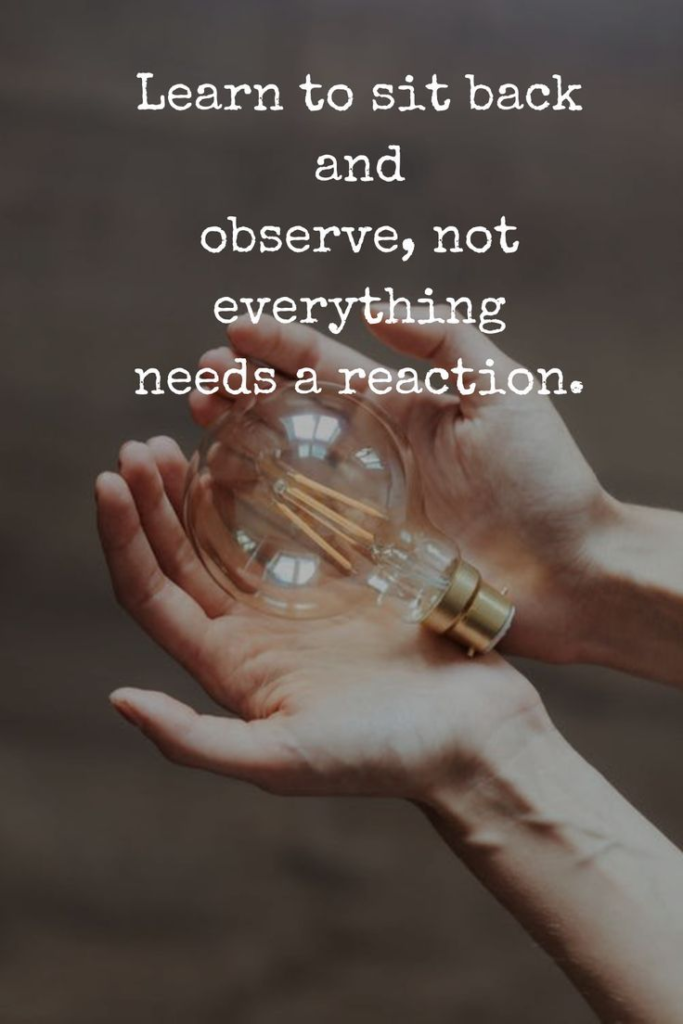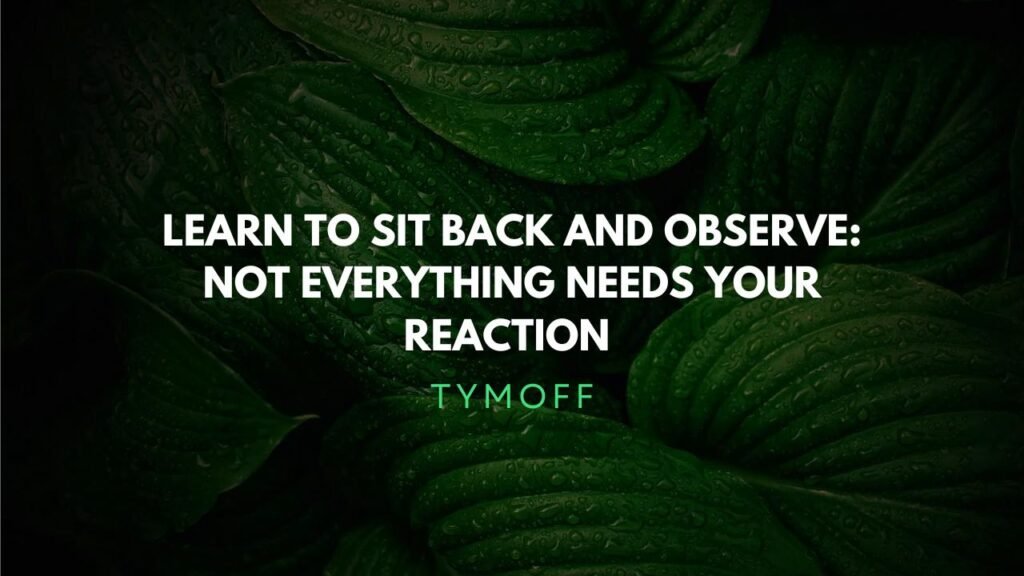Learn to Sit Back and Observe. Not Everything Need – Tymoff In today’s world, we often feel the need to react instantly to everything happening around us. However, there’s profound wisdom in knowing when to sit back and simply observe. This allows us to be more mindful, make better decisions, and avoid unnecessary stress. Here’s a detailed exploration of why observation can be more powerful than reaction and how you can master this approach.
Table of Contents
What Does It Mean to Sit Back and Observe?
Sitting back and observing means allowing situations to unfold without immediate interference. It’s about being aware of your surroundings and situations without rushing to respond. This doesn’t mean being passive; rather, it’s a proactive choice to watch and learn before deciding your next move.
The Benefits of Observation Over Reaction
Observing helps in gaining insights, avoiding rash decisions, and promoting emotional intelligence. It offers the following benefits:
- Perspective: You can see the bigger picture, which is essential for making informed decisions.
- Emotional Control: It strengthens your ability to understand your emotions and manage them better.
- Reduced Conflict: You can avoid escalating situations by pausing before reacting, thus preventing unnecessary conflicts.
Why Not Everything Needs a Reaction Learn to Sit Back and Observe. Not Everything Need – Tymoff
Reacting to every situation drains your energy, causing mental fatigue and emotional stress. Learn to Sit Back and Observe. Not Everything Need – Tymoff By choosing not to react, you conserve energy for more important matters, maintaining emotional balance. Learn to Sit Back and Observe. Not Everything Need – Tymoff
Cultivating the Art of Sitting Back

To develop the habit of sitting back and observing:
- Practice Mindfulness: Engage in daily mindfulness practices to enhance your awareness.
- Non-Judgmental Observation: Watch situations without immediately forming opinions.
- Patience: Give yourself time to process before making decisions or taking action.
Observation Leads to Better Decision Making
When you take time to observe before reacting, you gain valuable context that informs your decisions. This process leads to: Learn to Sit Back and Observe. Not Everything Need – Tymoff
- Deeper Understanding: Gathering more information allows for a better analysis of situations.
- Strategic Thinking: Observing helps you make long-term decisions rather than impulsive ones based on short-term factors.
The Role of Silence in Observation
Silence can be powerful. By staying silent, you can absorb more information, reflect, and eventually make wiser decisions. It’s not a sign of weakness but of strength and self-control.
Emotional Regulation Through Observation
One of the greatest benefits of sitting back and observing is emotional regulation. When you don’t react immediately, you give yourself space to calm down and approach the situation from a place of clarity.
Handling Conflict Through Observation
In conflict, observing can prevent further escalation. Instead of reacting with anger or frustration, try observing the situation, identifying emotional triggers, and calmly addressing the issue.
Observation as a Tool for Personal Growth
Self-awareness is key to personal development. By observing your own behavior, thoughts, and emotions, you can learn more about yourself and identify areas for improvement.
Lessons from Nature: The Power of Stillness
Nature teaches us the power of observation. Many animals rely on stillness to survive, and humans can learn from this natural wisdom. By adopting stillness, we can approach challenges with calm and thoughtfulness.
How Observation Enhances Creativity
Creativity thrives in stillness and reflection. When you allow yourself time to sit back and observe, you open your mind to creative possibilities that wouldn’t emerge in a reactive state.
Observation in Leadership
Great leaders often observe before making critical decisions. Whether it’s observing team dynamics or market trends, this skill helps leaders make more informed and impactful decisions.
Sitting Back Is a Sign of Strength
Sitting back and observing doesn’t mean you’re weak or indifferent. Learn to Sit Back and Observe. Not Everything Need – Tymoff It takes strength and confidence to resist the urge to react immediately and instead wait for the right moment.
Observation and Patience Go Hand in Hand
By observing situations patiently, you allow things to unfold naturally, Learn to Sit Back and Observe. Not Everything Need – Tymoff which often leads to better outcomes. Patience is essential in the practice of sitting back and observing. Learn to Sit Back and Observe. Not Everything Need – Tymoff
Combining Observation with Mindfulness
Learn to Sit Back and Observe. Not Everything Need – Tymoff Mindfulness helps you stay present, and observation is a natural part of mindful living. By observing your thoughts and surroundings without judgment, you engage in mindful practices that reduce stress and enhance focus. Learn to Sit Back and Observe. Not Everything Need – Tymoff
How to Apply Observation in Daily Life
- Work: Learn to Sit Back and Observe. Not Everything Need – Tymoff Pause before responding to situations in meetings or workplace conflicts.
- Relationships: Observe body language and tone of voice to better understand your partner.
- Personal Growth: Regularly reflect on your thoughts and actions to understand yourself better.
Observation Enhances Communication
In communication, observing the other person’s body language, tone, and emotional state allows you to respond in a way that fosters understanding rather than conflict.
The Science Behind Observation
Studies have shown that observation activates areas of the brain responsible for analytical thinking. This allows you to process information more deeply and make better decisions in both your personal and professional life.
Key Lessons for Sitting Back and Observing
- Not Every Situation Requires a Reaction: Choose your responses wisely.
- Cultivate Mindfulness: Being present helps in making clearer decisions.
- Practice Patience: Patience allows for better observation and understanding.
Conclusion: Embrace the Power of Observation
Mastering the art of sitting back and observing can lead to significant personal and professional growth. It allows you to approach situations with clarity, patience, and wisdom. While the urge to react quickly can be strong, the benefits of pausing and observing are far greater.
By incorporating observation into your daily life, you will improve your decision-making, relationships, and overall well-being. Learn to sit back, watch, and allow life to unfold. Often, the power lies in what you don’t do.
Read Also: Cleveland Cavaliers vs Boston Celtics Match Player Stats







